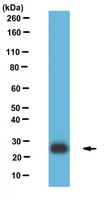LST1 promotes the assembly of a molecular machinery responsible for tunneling nanotube formation.
Schiller, C; Diakopoulos, KN; Rohwedder, I; Kremmer, E; von Toerne, C; Ueffing, M; Weidle, UH; Ohno, H; Weiss, EH
Journal of cell science
126
767-77
2013
Show Abstract
Carefully orchestrated intercellular communication is an essential prerequisite for the development of multicellular organisms. In recent years, tunneling nanotubes (TNT) have emerged as a novel and widespread mechanism of cell-cell communication. However, the molecular basis of their formation is still poorly understood. In the present study we report that the transmembrane MHC class III protein leukocyte specific transcript 1 (LST1) induces the formation of functional nanotubes and is required for endogenous nanotube generation. Mechanistically, we found that LST1 induces nanotube formation by recruiting the small GTPase RalA to the plasma membrane and promoting its interaction with the exocyst complex. Furthermore, we determined that LST1 recruits the actin-crosslinking protein filamin to the plasma membrane and interacts with M-Sec, myosin and myoferlin. These results allow us to suggest a molecular model for nanotube generation. In this proposal LST1 functions as a membrane scaffold mediating the assembly of a multimolecular complex, which controls the formation of functional nanotubes. | 23239025
 |
Rat monoclonal antibodies specific for LST1 proteins.
Schiller, C; Nitschké, MJ; Seidl, A; Kremmer, E; Weiss, EH
Hybridoma (2005)
28
281-6
2009
Show Abstract
The LST1 gene is located in the human MHC class III region and encodes transmembrane and soluble isoforms that have been suggested to play a role in the regulation of the immune response and are associated with inflammatory diseases such as rheumatoid arthritis. Here we describe the generation and characterization of the first monoclonal antibodies against LST1. Two hybridoma lines secreting monoclonal antibodies designated 7E2 and 8D12 were established. The 7E2 antibody detects recombinant and endogenous LST1 by Western blot analysis while 8D12 reacts with recombinant and endogenous LST1 in immunoprecipitation and flow cytometry procedures. The newly established antibodies were used to survey LST1 protein expression in human cell lines, which was found to be tightly regulated, allowing the expression of transmembrane isoforms but suppressing soluble isoforms. | 19663701
 |


















